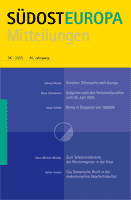Roma in Bulgarien seit 1989/90 – Lebensbedingungen, Handlungsansätze, Entwicklungsperspektiven
Roma in Bulgaria since 1989/90 – Living Conditions, Courses of Action, Perspectives of Development
Author(s): Sonja SchülerSubject(s): Politics / Political Sciences
Published by: Südosteuropa Gesellschaft e.V.
Summary/Abstract: The Roma are a heterogeneous ethnic group whose identity is multidimensionally diverse. According to estimates, roughly 8 millions of Roma live in many European countries, where they are “traditionally” one of the poorest and most marginalized minorities. The article describes characteristics and backgrounds of the situation with which large segments of Bulgaria’s Roma population have to deal. During socialism, in spite of repressive measures that aimed at the Roma’s forced economic integration and at their complete assimilation, they benefited from permanent employment, regular wages, social security and better opportunities for education. After the collapse of socialism, the institutional framework provided a basis for ethno-specific organisation and articulation of interests, as well as for cultural development and social and political participation. Meanwhile, the transition brought new hardship – unemployment rates above average, impoverishment, discrimination, increasing segregation in the spheres of housing and education and severe health problems. The majority of the Bulgarian Roma population is trapped in a vicious circle of poverty and exclusion. However, the Roma did not become the focus of a specialized state policy for the improvemnt of their living conditions. The situation contains enormous social and economic risks.
Journal: Südosteuropa Mitteilungen
- Issue Year: 2005
- Issue No: 06
- Page Range: 34-47
- Page Count: 14
- Language: German
- Content File-PDF

